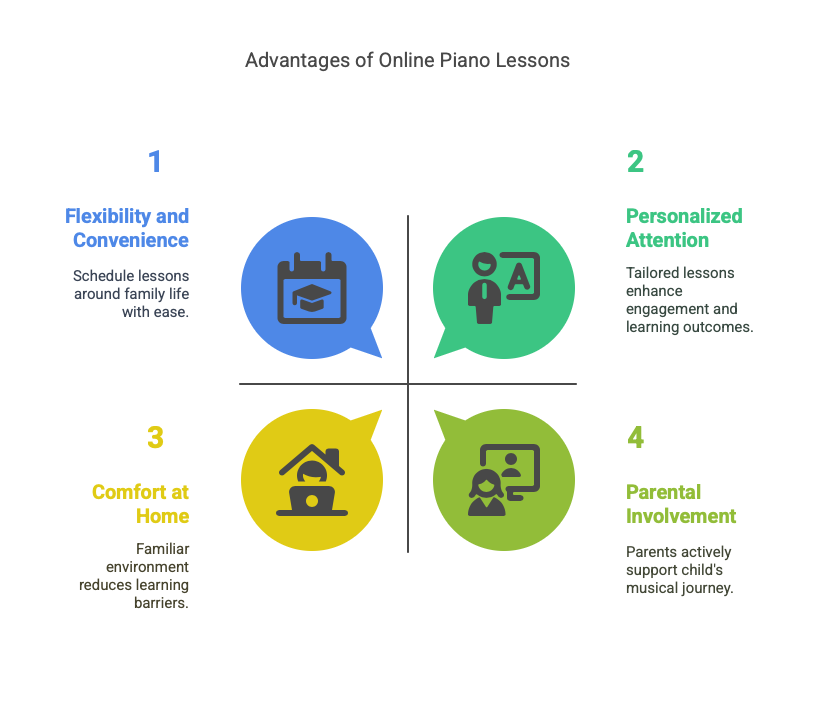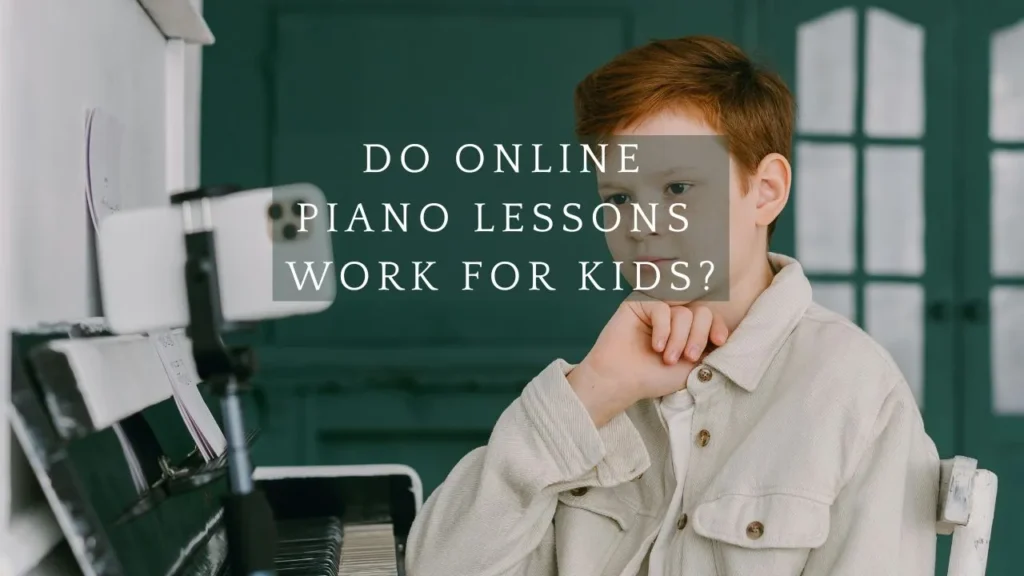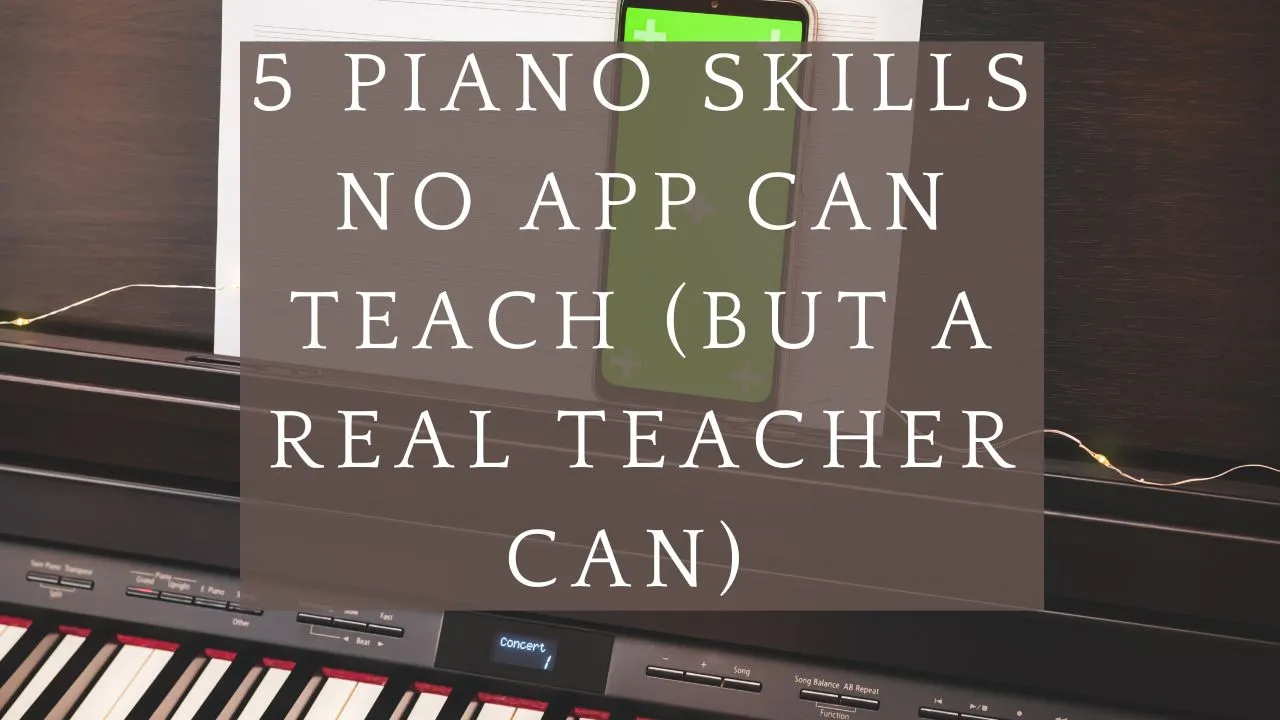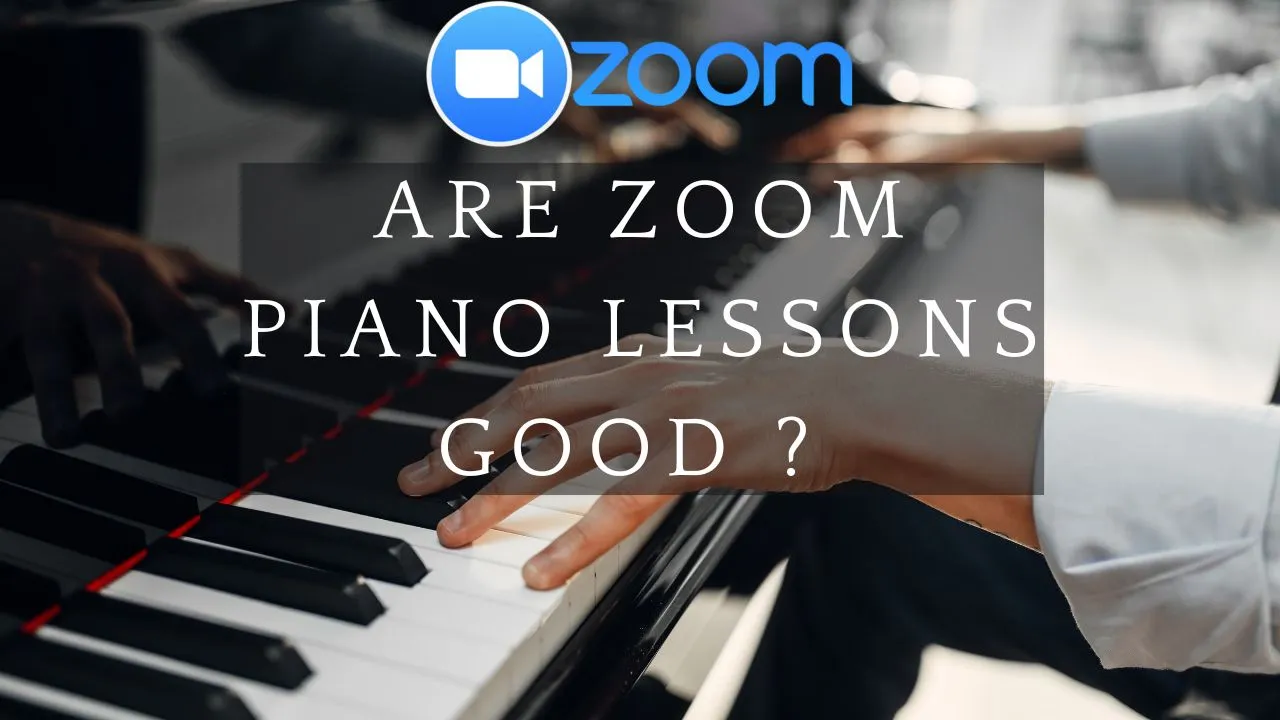Online piano lessons have become more popular than ever – especially for busy families and homeschooling households. But do online piano lessons work for kids?
As a piano teacher who has seen this firsthand, I can say with confidence that they do work – and can even offer advantages over traditional lessons.
In this post I’ll explain why, drawing on research and my own experience. You’ll learn about the proven benefits of learning piano (online or offline), how one-on-one virtual lessons actually keep children engaged, and how to address common concerns like screen time.
By the end you’ll see that online piano lessons can be a safe, effective, and even better option for many children.
The Effectiveness of Online Piano Lessons for Kids
Let’s start with the big question: Can kids really learn piano effectively online? The good news is yes – extensive research on music education backs this up.
Learning piano (whether on Zoom or in person) gives children measurable cognitive and developmental benefits. For example, studies consistently find that musical training improves memory, language, and concentration. Research shows that musically trained children showed “better verbal memory, second language pronunciation accuracy, reading ability, and executive functions” than untrained peers. In other words, learning piano doesn’t just teach music; it also helps with school skills like reading and problem-solving.
A major review of 29 studies in Frontiers in Psychology found that music lessons boost executive functions – the brain’s self-control and attention skills – in kids. That report concluded music training has a “beneficial effect in core executive function performance, primarily in inhibitory control, and to a lesser extent in working memory and cognitive flexibility.”
In plain English, piano lessons help children focus better, resist distractions, and use working memory – all skills that aid learning in the classroom.
Other research highlights lasting brain changes. One 2009 study showed that only 15 months of piano lessons in early childhood produced structural brain changes in the motor and auditory regions. These changes were directly linked to better motor skills (like hand coordination) and listening skills in the kids who took lessons.
Likewise, MRI studies at Boston Children’s Hospital found that two years of musical training enhanced the brain areas responsible for executive improvements in cognitive control and memory retention were noted. Remarkably, researchers suggested, “Musical training may actually help set children up for a better academic future.”
In practical terms, this means kids taking piano lessons often see improvements in school performance. For example, studies find that math and spatial skills can improve too. One review reported a typical 10–20% boost in math abilities for children with regular piano practice.
Even more strikingly, preschoolers who learned music alongside math showed a 20% higher score on number and sequence tasks compared to a control group. These gains make sense: piano lessons train timing, patterns, and sequences, which overlap with math and logic skills. Similarly, piano playing enhances fine motor coordination – the finger dexterity needed for writing and typing – far more than no music training.
All this science shows that any piano lessons benefit the developing mind. But what about online specifically? The same brain-boosting benefits apply whether lessons are in-person or on online. In fact, data from virtual teaching itself is very encouraging.
One review found that 350 children taking online piano scored significantly higher (7–8% improvement) than a control group without lessons.
Another small study reported that 35 students rated their online learning experience very highly – an average of 4.2 out of 5 for “learning implementation”. In short, kids can learn just as well online when instruction is one-to-one and interactive.
Finally, long-term tracking suggests that early music study predicts better outcomes later in life. Children who took piano lessons often go on to have higher IQ scores and academic performance as teenagers and adults. The intensity and consistency of practice correlates with these gains. So the evidence is clear: online piano lessons do work for kids, giving them cognitive, academic and even emotional advantages.
Advantages of Online Piano Lessons
Besides these scientific benefits of music, online lessons have several practical advantages for children and families. In many ways, a live Zoom lesson can be more convenient and comfortable than driving to a studio. Here are the top perks:
Active One-to-One Engagement: Online lessons are almost always one-on-one, which means your child gets the teacher’s full attention. Research notes that one-on-one instruction “keeps children actively involved” throughout the lesson.
The student and teacher are talking and playing almost continuously – there’s no time to zone out. Kids stay focused because they have to respond and play when prompted. (Compare that to a classroom music class, where a child might passively sit for much of the time.) In my own teaching, I’ve found that children are actually more attentive online, because they know the teacher is watching them directly.
Flexibility and Convenience: Virtual lessons let you schedule music classes around your family’s life. Online piano offers “unmatched flexibility for busy families,” as one source puts it. You can fit lessons in without worrying about traffic or rigid studio hours. This is ideal for children juggling school, sports or other activities.
Parents can even arrange classes during the day if their kid is homeschooled or has a free afternoon – or in the evening when it’s quieter at home. Plus, because there’s no travel time, parents often find it less stressful (and less expensive) than driving to a teacher. I often hear from parents: “It’s so much easier, and the kids are happier learning in their own home.”
Comfort and Confidence at Home: The home environment itself boosts learning. Kids typically feel safest and most relaxed at home, which means they are more willing to try new things and make mistakes (an essential part of learning).
One analysis explains that children in online lessons get to learn in their “ultimate comfort zone” – free of distractions or pressure from an unfamiliar studio. They sit on a familiar chair, look at familiar walls (maybe even their favourite poster), and can ask questions without embarrassment. This comfort often leads to higher confidence – kids aren’t afraid to stretch out on the piano or adjust their seating, and they ask more questions. I’ve found shy children become much more outgoing once they do lessons at home, because they feel secure.
Personalised Attention and Pacing: Because the teacher’s eyes are on just one child, the lesson can be fully customised to that student’s level and learning style. The teacher can immediately gauge what the child understands or struggles with, and pivot accordingly. I can adapt each Zoom lesson to what my student needs that week – whether it’s more rhythm practice or focussing on a particular passage. This personalised pacing ensures the child never feels left behind or held back.
Parental Involvement: Online lessons make it easy for parents to be there. In fact, many parents watch along with their child during the lesson, which is harder to do in a music studio. You can see exactly what the teacher is doing and join in on practice and encouragement.
This involvement strengthens the parent-child bond around learning. It also means busy parents stay aware of their child’s progress – you’ll know if the child needs a new piano bench, or needs a reminder to practice a particular exercise. Studies show that parental support is crucial for a child’s musical progress.
Interactive Learning Tools: Modern online lessons can even leverage digital tools and fun multimedia. Many teachers (myself included) use colourful on-screen visuals or apps during the lesson. These elements simulate the “hands-on” feel of a studio. For instance, I often do online music theory games and share the sheet music online to discuss a particular passage.
Overall, these advantages – flexibility, engagement, comfort and parental support – make online piano lessons an attractive option. In fact, I’d argue that in many ways, the online format is perfectly suited for kids, as long as the lessons are well-structured.

Addressing Common Concerns
Of course, many parents have concerns about online lessons, especially when it comes to screen time and keeping kids focused. These are valid points, but they can be managed well:
Screen Time: It’s true that kids are on screens more than ever. However, an important distinction is that a online piano lesson is an active educational screen use, not passive entertainment. The child isn’t watching cartoons; they’re playing an instrument and interacting with a teacher. Pediatric guidelines suggest limiting recreational screen time for young children (for example, about 1 hour a day for 2–5 year olds). A weekly piano lesson of 30–45 minutes easily fits within these limits. Plus, it might reduce time otherwise spent on games or videos, because it’s a scheduled activity that the child looks forward to.
Focus and Engagement: Some worry younger children might not pay attention online. In practice, this is actually one of the strengths of one-on-one lessons. Because each student is being called on regularly and given exercises in real time, they stay on their toes. Teachers often use tricks like clapping or counting games at the start of a lesson to get the child’s attention and gauge their mood.
We can vary the activities every few minutes – from playing a short piece, mastering a scale, to clapping rhythms, to drawing musical symbols – to keep it lively. Moreover, because the child knows the teacher is watching via camera, they tend to behave better. I also make sure parents know how to help by setting up a distraction-free space (no toys or TV in the background) and sitting nearby (especially for younger kids) to help the child stay on task.
Technology Glitches: Yes, sometimes a connection or audio issue may pop up. But most of these can be prevented with good setup: a stable Wi-Fi connection and a decent microphone. As a precaution, I always do a quick sound check with students before lessons. And nearly every time, the minor hiccups resolve quickly. Many families actually find the effort is worth it given the convenience saved on travel. To further ease concerns, I often suggest scheduling lessons at a consistent time and place (same room, quiet spot) so technology becomes routine. Once the setup is done, it runs smoothly.
Quality of Instruction: Another worry is whether quality suffers online. However, because online lessons force us to clarify things verbally and visually (for example, saying “move your left hand a little back” or showing a fingering on camera), many technical details become clearer.
I’ve found that kids who struggle with posture or hand position actually benefit from seeing the teacher’s hands up close on camera, which they might not notice in a studio where they’re further away. The key is choosing a teacher experienced in online teaching, which brings us to the next section.
In short, while it’s reasonable to have concerns, most of them can be addressed by choosing a good setup and teacher. The engaging nature of one-on-one online lessons actually counteracts many of the negatives of screen use, turning screen time into learning time.
My Experience Teaching Piano Online
Let me share a personal story. Eight years ago I moved from the UK to Spain, and I wondered what would happen with my piano students back home. At the time, online lessons were not common – certainly not for children’. To my surprise, almost all of my students (kids and adults alike) chose to continue lessons with me online via Zoom rather than find a new local teacher. They were eager to stay with a teacher they trusted, and their parents were open to trying something new.
I admit, at first I had doubts. Would a 7-year-old really learn over a screen? But we made it work. I set up my home studio in Spain with good lights and cameras, and each family set up a camera by their piano. I kept lessons varied to match each child’s attention span, and I often paused to make sure the child was following.
The results amazed me. Not only did my students continue progressing (some of these kids are now working towards ABRSM diplomas!), many actually thrived. They practised diligently because they could show off their pieces live to me each week. Parents also reported that the flexibility made daily practice easier – no rushing back from work to make a 5pm lesson, for instance.
One of my youngest students was 5 when I moved; she’s now 13 and still in lessons. Over the years, most of those families have seen their children advance to higher levels than they might have expected. Today, many of my UK students are still my students online, and some have even recommended online lessons to their friends. This real-world experience confirms all the research: kids can learn piano very well online, and sometimes the continuity with a beloved teacher means they progress better than they would have otherwise.
What to Look for in a Good Online Piano Lesson
If you’re considering online piano lessons for your child, here are some tips on finding a great program:
Qualified Teacher: Make sure the instructor is qualified to teach children and experienced with online teaching. Check that they have a music education background or many years of teaching experience. Online teaching is a skill too – a good online teacher will know how to demonstrate things clearly on camera and keep a child’s attention.
Structured Curriculum: A good lesson plan should have clear goals for each student. Look for a teacher who uses a known method or syllabus (like ABRSM, Royal Conservatory, etc.) and has a progression path. This ensures your child learns fundamentals in a logical way.
Technology Setup: Even for the parent checking things out, it’s easy to notice: during the consultation is the sound clear? A good online teacher will use a decent microphone (and perhaps a digital piano with a stable audio connection) so the child hears both the teacher and the teacher hears each note the child plays. Some teachers might ask you to set your piano at max volume (if it’s digital) and mute the student’s microphone temporarily when they play, to avoid delays. All these practices indicate a teacher who knows how to optimize Zoom/audio for piano.
Comfort and Safety: Especially for younger kids, it helps if the teacher is friendly and patient. Some teachers use secure Zoom links, require meeting passwords, or only allow known students into the call. Always check that security measures are in place – it’s common for reputable teachers to do this.
Final Thoughts
So, do online piano lessons work for kids? In summary, the combination of scientific evidence and personal experience makes one thing clear: online piano lessons for kids absolutely can work, and can even excel. They give children all the brain-boosting, confidence-building benefits of music study while adding flexibility and comfort. If your family is considering it, rest assured that many educators and experts agree: interactive, live lessons via video are effective.
If you’ve read this far and are curious to try, I encourage you to give it a shot. With the right teacher and environment, your child can learn and grow musically just as they would in person.
Ready to get started? Visit my online piano lessons page to find out more about how I conduct lessons online, and to book a free consultation. It could be the first step toward a lifelong love of music – all from the comfort of home!
FAQs – Do Online Piano Lessons Work for Kids?
1. Can children really learn to play the piano well through online lessons?
Yes, absolutely — and the research supports it. Children who take one-to-one online piano lessons can make just as much progress as those learning in person. In fact, studies show that musical training improves memory, focus, language, and even maths skills — and these benefits are just as strong when the lessons are delivered online. The key is having a good teacher and regular practice at home.
2. Will my child stay focused during an online piano lesson?
They will — especially if the lesson is one-to-one and interactive. A good teacher will keep things varied and engaging, with activities like rhythm games, quick quizzes, and call-and-response exercises. Because the teacher is focused entirely on your child, there’s no opportunity to zone out like in a group class. Many parents find their children are actually more attentive online than in person.
3. Is online learning just more screen time? Should I be worried?
That’s a common concern, but online piano lessons are very different from passive screen time. Your child isn’t just staring at a screen — they’re actively using their hands, ears, and brain. They’re playing music, responding to instructions, and receiving feedback. In fact, it’s one of the healthiest and most productive ways a child can spend time in front of a screen.
4. What are the benefits of learning piano at home instead of in a studio?
There are quite a few. First, your child is more relaxed and confident in a familiar space. They’re not distracted by a new environment or anxious about making mistakes. Second, online lessons are much easier to fit into your routine — no driving, no waiting around, no rushing dinner. And finally, you can sit nearby and be more involved in their learning, which most children find encouraging.
5. What should I look for in a good online piano teacher for my child?
Look for a teacher who understands how children learn and has experience teaching online. Clear video and sound quality are important, but so is personality — your child needs to feel comfortable and encouraged. A good online piano teacher will make lessons fun, structured, and tailored to your child’s pace.





